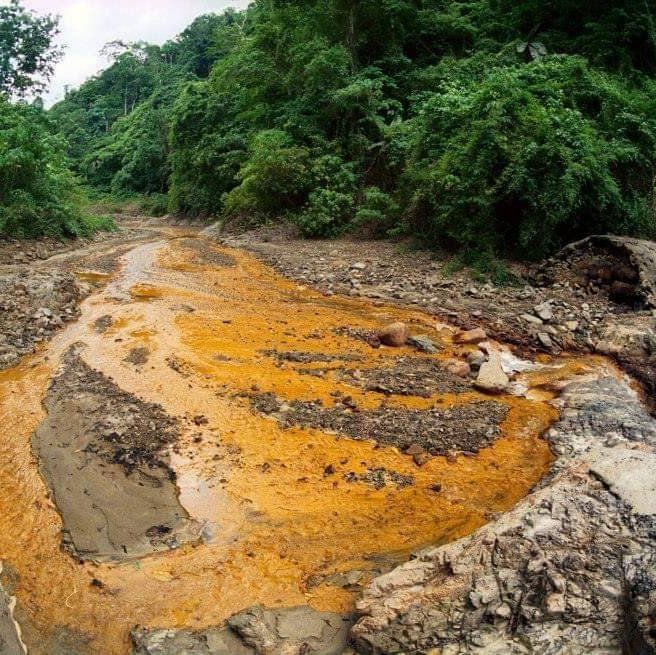Binding Treaty needed to ensure accountability for transnational corporations: Mogpog River case study

Legal Rights and Natural Resources Center (Friends of the Earth – Philippines)
On 6 December 1993, the tailings dam owned by Marcopper Mining Corporation broke, flooding Mogpog river - a major waterway on the island of Marinduque, Philippines - with toxic waste. It released an overwhelming amount of silted water that submerged and destroyed properties and sources of livelihood, exposing local communities to serious health risks. The dam, made of earthen materials, was constructed despite strong public opposition over its inadequacies. A heavy but not unusual rainfall caused the dam to breach. Today, heavy rains regularly cause the dam to overflow and contaminate the river. Residents filed a case in the local courts for damages against Marcopper. The case has been ongoing for over two decades and has yet to reach a final resolution.
Marcopper started operations in 1969. It was co-owned by Canadian firm Placer Dome and listed on the Toronto Stock Exchange. The Philippine Government share was held under the dictatorial administration of Ferdinand Marcos, behind allegedly ‘front’ corporations. In 2006, Placer Dome was purchased by Barrick Gold.
On 24 March 1996, another tragedy struck. The concrete plug sealing Marcopper’s open pit drainage tunnel ruptured, discharging two to three million tons of mine waste into the 26km long Boac River, another major river system of the island. The deluge caused a flash flood that submerged villages under six feet of floodwater and silted vital river channels with toxic mine tailings. The river has since been declared biologically dead.
In 2005, the Provincial Government of Marinduque filed a case against Placer Dome and Barrick Gold in Nevada, USA over “public health injuries” and the destruction of the nature, ecology and wildlife. The case was dismissed.
In yet another case, fishing communities filed a case against Placer Dome and Marcopper based on their constitutional right to healthy and balanced ecology. The local court dismissed the case on the ground of lack of jurisdiction because Placer Dome and Barrick were considered non-resident, foreign corporations.
This narration of events reveals the difficulty local residents and local government face when seeking to hold transnational corporations accountable for the destruction and human rights violations caused by their business operations in the countries where they operate.
Legal Rights and Natural Resources Center (Friends of the Earth – Philippines)
It highlights the changing norms of who are regarded “duty bearers”. With their financial resources and political clout, transnational corporations can influence and co-opt state regulatory powers. Or at the very least, can navigate legal technicalities and processes to skirt their obligations and accountabilities. Arguably, the growth of corporate power has undermined state regulatory sovereignty. The recognition of the growing influence and violations of corporations brought about the adoption of the landmark United Nations Guiding Principles on Business and Human Rights (UNGPs) in 2011. But, despite the UNGPs’ unanimous adoption it has remained that—guiding principles that are non-binding, directive rather than mandatory. Initially appreciated as corporate social responsibility that often served to muddle corporate accountability.
International law mainly holds states accountable for their human rights violations and for ensuring accountability for the violations perpetuated within their jurisdictions. An increasing number of public-private partnerships or state-sanctioned corporate business operations, not to mention corruption, put the state’s duty-bearing obligation in doubt. As illustrated by the Marcopper case, local or national mechanisms often fail to be adequate avenues for redress - at times, even for the state itself. By no means should instruments such as the legally binding treaty substitute for the obligations of states of their human rights obligations, but rather add to the legal arsenal for peoples to seek accountability for the violations of their rights. This is essential as the Marcopper case underlines the inadequacy of current voluntary submissions of transnational corporations. TNCs must be obligated to protect the rights and ensure redress of peoples.
The communities in Marinduque have not lacked in their efforts to hold Marcopper and its corporate iterations accountable, yet have met constant challenges seeking access to justice due to the lack of an effective legal system to support their claims. Meanwhile, the harmful impacts of TNC’s business operations continue to be suffered by communities. For all these reasons, we are supporting a legally binding instrument and hope constructive debate and progress will take place in Geneva in a few weeks’ time.
By Mai Taqueban, Executive Director, Legal Rights and Natural Resources Center (LRC) [Friends of the Earth, Philippines]


